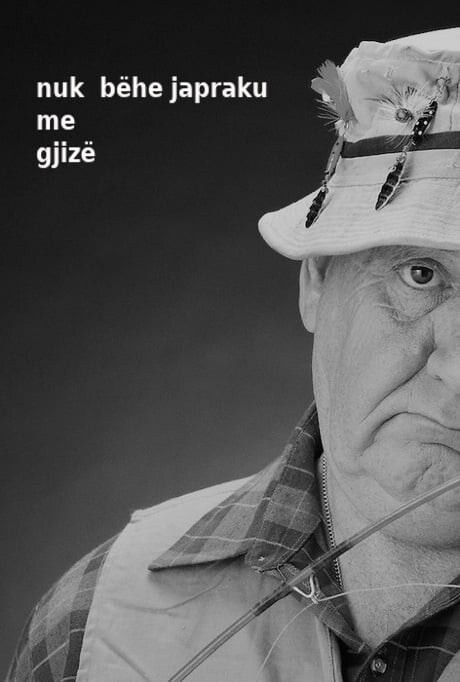Kapitulli i trete : ja dhe Shqiperia e post- “Rri në shpi qe te paguhesh”
po shkova un nga Korea. Me moren edhe me patente B. Per mua ja vlen…
per Busanin i bere mire kerkimet ne internet edhe s’le video ne youtube pa pare. Tani lere pandemine po na fol pak per Pandora Papers
Nuk e kuptova kete

Ja ku erdhi dita qe edhe neozelandezja-kishoteske te dorezohet
e hoqem qelbesiren

Absolument : nuk lëftohet me mullinjt e erës
Njerzimi nuk do absolutisht të vdesë (pranej ja jep Marlonit).
Chisciottismo di Unamuno nasce dalla meditazione della morte, come
reazione alla morte. Il chisciottismo è ansia di non morire, è medicina contro
la morte. Alonso Chisciano è solo e sconosciuto, senza una persona amica,
in una casa fredda e vuota, in un paesucolo senza vita, sente che la vecchiaia si > avvicina, che la morte bussa alla sua porta, e si ribella. E’ l’ossessione della morte > che lo fa impazzire, che lo trasforma in Don Chisciotte.
Il vero nemico di Don Chisciotte, il nemico-fantasma presente in ogni sua
avventura, è la morte; anche se essa compare solo all’ultimo capitolo, quando egli > rinsavisce. Don Chisciotte non sente più il problema della morte,
perché è pazzo e il pazzo si crede eterno. La follia chisciottesca è fede di
eternità. Chi la soffre invece fino all’agonia è Alonso Chisciano, perché
ragiona e la ragione è l’araldo della morte, quella che ci sussurra che dovremo > morire. La sicurezza di Don Chisciotte, il suo eroismo intrepido,
nasconde un’angoscia soffocata, che volta per volta affiora nei momenti di
avvilimento, quando la follia· tace e parla il buon senso di Alonso Chisciano. Per
Unamuno, chi muore alla fine del romano non è Don Chisciotte,
ma Alonso Chisciano, perché solo la ragione ci conduce alla morte. La
follia, che è ideale, è garanzia di vita. Per questo Don Chisciotte non può
morire.
vendim me mend, Zelande e Re. Shume mire, zgjedhje e duhur tani qe vaksinat jane rruges, si me thene
In the face of increased pressure over her approach, Ardern said she was not looking to record zero cases, but to stamp out the virus in an aggressive manner.
“It’s clear that a long period of heavy restrictions has not got us to zero cases. But it’s OK…elimination was important because we didn’t have vaccinations. Now we do. So we can begin to change the way we do things,” she said.
qelbesira qe hidhen perpjete kur fiton corona, vetem nder lapanjoze e ziliqare shqiptare i gjen
do mendere te forta te mposhtesh pandemine, s’esht pune per qaramane neoliberale
https://news.yahoo.com/portugal-virtually-no-one-left-141101052.html
Keshtu do e ule hunden Kina edhe per të blere ‘vaksinen amerikane’. Njesoj si me qymyrin. S’ka ku shkon
Pikerisht pikerisht : Jacinda jote qe-i-dha-dermen-virusit, ishte nje katastrofe e vertete persa i perket vaksinimit. I ke bere mbrojtjen më të keqe
ne rregull, sakte, por mbetet mister i pashpjegueshem perse ti po me keto qelbesira kenaqesh duke pare e analizuar sinema perverse, e cila nuk ka asnje ndryshim nga perversiteti i perballjes me epidemine.
Hidhu e komento tek tema e lesbikut kinofil se ka sjelle nje film pervers kastile per ty.
ti qenke keq o i gjore
strategjia e Zelandes eshte e shkelqyer:
- Karantine & kufizime - sa kohe s’ka mundesi vaksine
- hapje graduale paralel me ndertimin e imunitetit artificial prej vaksinimit
kush te tha ty se karantinimi ish e vetmja strategji per vende si Zelanda me qellim eliminimin e virusit (jo eradikimin, sic perpiqet Kina e cila ndryshon, sepse ka sistem organizimi grassroots ne mbikqyrje te kovidit)
The decision of local authorities in Harbin, Northeast China’s Heilongjiang Province, to euthanize three pet cats that tested positive for COVID-19 has aroused controversy. Unsurprisingly, some US media outlets and Western users on social media platforms like Twitter have taken the chance to attack China. They blasted the decision as an act of cruelty against life and a result of China’s “fear-mongering about COVID-19.”
China is being criticized for cruel treatment on life because of putting down three virus-infected cats - are they serious? The US’ COVID-19 death toll now has neared 700,000, surpassing the figure of the devastating 1918 flu pandemic. Given such a botched anti-pandemic situation, those Westerners are in no position to preach China about how to treat life.
In China, animal rights activists have also criticized the decision. They called for health authorities to offer a more ethical and standardized way to treat virus-infected animals. But the majority of the Chinese people believe euthanizing the cats is a necessary decision in line with the law for the sake of epidemic prevention and control. The epidemic prevention and control staff members are believed to have fully assessed the risks of virus transmission and adopted the most necessary method.
The end-of-life decision is backed up by Law of the People’s Republic of China on the Prevention and Treatment of Infectious Diseases, which stipulates that when an infectious disease breaks out, infected wild animals and domestic animals can be controlled or killed if necessary.
Feng Zijian, deputy director general of the Chinese Center for Disease Control and Prevention, said in an interview with The Beijing News on Tuesday that there was little experience in dealing with infected animals and that if a cat continuously carries a virus, the risks of transmission exist and great caution is needed to deal with it. He stressed that should a cat repeatedly test positive for COVID-19, it has to be put down. Moreover, it’s also noticeable that as the pandemic rages on worldwide, cases that infected animals such as tigers, cats and dogs are euthanized in other countries have been not uncommon.
“From the perspective of public health crisis management and control, euthanizing the three cats is a decisive measure to minimize negative effects and avoid worst results,” Shen Yi, a professor at Shanghai-based Fudan University, told the Global Times. “If cat-to-human transmission really happens and a spread within the community breaks out, will those critics bear the responsibility at that time? And how can they afford that?” Shen asked.
With the approaching of the week-long National Day holidays, the huge flow of people during the period is bringing great challenges to the epidemic prevention and control. Cities like Harbin where local new cases are still reported are facing an arduous task in effectively controlling and reducing the risk of the virus spread. The decision of the epidemic prevention and control staff to put down the cats has shown their responsible attitude toward the safety of people’s lives.
The owner of the cats, a COVID-19 patient, is receiving treatment in hospital. Her sadness is understandable. From her posts on Weibo, we can learn that the three cats were well taken care of by community workers before they were found to be virus carriers. The owner also said she understood that the country and people’s safety should be prioritized.
It must be pointed out that China is undoubtedly the most humanitarian country in the fight against the pandemic. Since the beginning of the epidemic, China has insisted on putting life first. It has upheld “people first, life first” and protected people’s life, health and safety at all costs. This is in sharp contrast with the US and some other Western countries, which disregard people’s lives but prioritize political and party interests. It’s no exaggeration to say cat lives matter more in China than COVID-19 patient lives matter in those Western countries.
“The subtext that those Western critics didn’t speak out is that it doesn’t matter how many people will be infected or killed by the virus as long as the three cats are not euthanized,” Shen said. However, what they care about are not the cats at all, but are finding another excuse to attack China’s anti-epidemic efforts, which only shows their moral powerlessness, Shen noted.
vazhdon ti besh mbrojtje te keqe Jacindes te thom